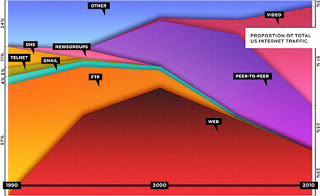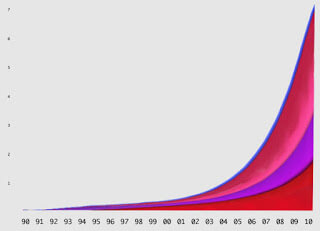Enough about the Death of the Web
 Wired Magazine released an article on its web site yesterday, The Web Is Dead. Long Live the Internet, that basically states that the web we’ve all grown to rely on for nearly twenty years is on its way out. There has been a lot of chatter about this over the last 24 hours, including an article on Boing Boing, Is the web really dead?
Wired Magazine released an article on its web site yesterday, The Web Is Dead. Long Live the Internet, that basically states that the web we’ve all grown to rely on for nearly twenty years is on its way out. There has been a lot of chatter about this over the last 24 hours, including an article on Boing Boing, Is the web really dead?
The points in Wired’s article are pretty simple. It cites examples of services we use all day over the internet that are not the web but are instead served through apps. A Twitter app, a Foursquare app, a Netflix app, a Skype app, and so on. This isn’t terribly surprising given that the bulk of these services are better served through a dedicated interface. A couple years ago, these companies would have had to rely on a web browser as their delivery platform, but given the rise of mobile devices (which are outpacing desktop computer use), the (mobile) web browser has proved to be an inefficient solution. So the app model came to bear out the features of these services, bolstered by the Apple app model.
But that does not mean the web is going or gone. We are at a point, and have been for quite a while, that not having a web page for your company (or even self) is akin to living in a shuttered shack in the back woods. Not using the web is like admitting that you are a secret Amish spy. There is an expectation from users that the web will always be there, that the web is an open sea of information chaos. This is not something you can access from just any app and is therefore not something that will just go away. I see it unlikely that users will download a Wikipedia app, or that small site owners will build apps to serve their content to a non-web-browser set of platforms. The ubiquity of HTML and web browsers will keep the web around for a long time to come.
These aren’t the points people are debating. The crux of the chatter on the web is all about the use of the web today. This chart shows the decline of the web (the big red area on the bottom) pretty steadily since 2000, along with the decline of every other internet service except video. This is what people are keying into — the pretty picture and the headline.
Boing Boing looked at this chart and recognized that the numbers were relative, that showing the web as declining was false when considering the overall growth in traffic (the average reader should have clued in when seeing the decline of everything except video). Using the same source that Wired used for its chart, Boing Boing recast the chart using total internet traffic as the vertical axis, removing the relative nature of the graph, and produced this:
As we can see, web traffic has in fact been on the rise.
These two charts essentially settle the issue that most people have been asking about — is the web really on the decline? The short answer is that no, it is not. The longer, more involved answer is that, as Wired points out, other aspects of the internet are poised to chip away at the ubiquity of the web as the be-all end-all resource for all users.
It’s unfair to view the Wired article strictly in the light of actual current use, but Wired did choose the title for a reason. It certainly got people talking, at least until another meme comes along today and sweeps it away.
Related
Speaking of research (I’m looking at you, interwebs users):
Update (Sept. 14, 2010): Found this on the innertubes today. While it mostly lambastes Wired and skips the discussion of the “web is dead” meme, it’s kind of funny and is an entertaining look at journalism:


Leave a Comment or Response